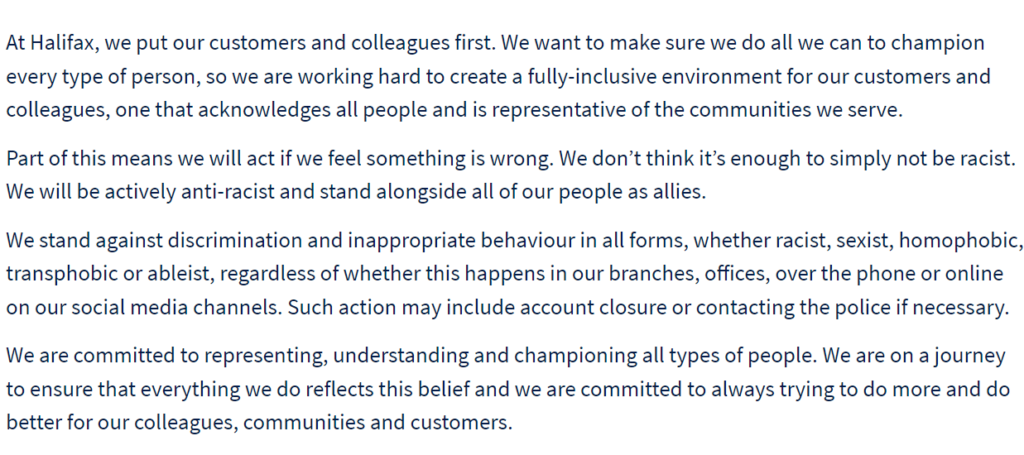What they stand for
The Mail wasn’t wrong about that “we’ll call the cops on you” page at Halifax. Home > Who we are > Inclusion and diversity.
Halifax: What we stand for
Ensuring an inclusive environment
At Halifax, we put our customers and colleagues first. We want to make sure we do all we can to champion every type of person, so we are working hard to create a fully-inclusive environment for our customers and colleagues, one that acknowledges all people and is representative of the communities we serve.
Part of this means we will act if we feel something is wrong. We don’t think it’s enough to simply not be racist. We will be actively anti-racist and stand alongside all of our people as allies.
We stand against discrimination and inappropriate behaviour in all forms, whether racist, sexist, homophobic, transphobic or ableist, regardless of whether this happens in our branches, offices, over the phone or online on our social media channels. Such action may include account closure or contacting the police if necessary.
We are committed to representing, understanding and championing all types of people. We are on a journey to ensure that everything we do reflects this belief and we are committed to always trying to do more and do better for our colleagues, communities and customers.
It’s funny how this performative, look how awesome we are virtue-signalling is happy to include threats including threats to call the police.
Again: they’re a bank. Not a political party, not a collective of activists, not social media celebrities; they’re a bank.
In case they delete it…


Sexism must have been included on their list of “discrimination and inappropriate behaviour” by mistake, unless, of course, it’s Genderspeak for “the heretical idea that there is such a thing as biological sex”, or “the bigoted view that biological females exist as an identifiable group and have their own separate issues worth addressing in their own right”.
They promise to keep moving the goalposts.
The promise to “do the work” or to “do better” is the oath an abuser extracts from a victim. It’s considered cliche for a writer to depict someone in an abusive relationship swearing in tears, “I’ll do better,” or, “I’ll work harder.” I for one can’t hear (or read) protestations of that sort without hearing as copula, “… so please, don’t leave me,” or another variation on the theme. That these phrases have become the de facto analogue to “Amen” in the social and political circles in which I grew up, and obviously elsewhere, fills me with the sort of revulsion and fingernail-crawling dread I used to associate with well crafted horror.
Could we change the channel now, please?
This is going to be the only way this ends. Once it starts hitting these companies where it hurts. They are going to find out that all this cultish inclusive bullshit is simply not profitable.
Unfortunately, it takes a while for that sort of fact to make its way to executives. Then there’s a period of denial, especially among those who’ve been advocating the unprofitable thing. Then there’s fighting the true believers on staff, of whom some will never be convinced that the nonsense is unprofitable and others will not care about profitability. Then there’s the long, slow process of turning a ship, with rainbow sails and inclusive sheets, carrying an intersectional cargo.
I’ve been told many times that companies don’t do something if it isn’t profitable, usually as a premise in an argument that the public at large are okay with or even support something. But while the primacy of profit is real, the phrasing is misleading. The problem’s in the verb: don’t. A more accurate statement might be, “companies try to maximize profit.” Companies (in general) want to avoid doing unprofitable things. However, corporate decisions are made on the basis of imperfect information, so it’s inevitable that some decisions happen to negatively affect the bottom line. There’s also the complication that customer response is often neither immediate nor unambiguous.
I’m kinda sick of hearing that argument, actually.
(Not talking about you, twiliter, in case it’s not clear.)
Also, thought I’d give an example of the sort of corporate inertia I’m talking about: Disney. Disney
has been embracing, for lack of a better term, wokeness for a while now. They’ve largely been unaffected by this, as their brand and IPs have the kind of cachet that acts like ablative armor. However, like everything else, prestige is a finite resource, and they appear to have expended most of it, with their stock price falling over 45% over the past six months.
Well I think companies do unprofitable things for various reasons, sometimes because it’s just the right thing to do. Raising base wages, compensating for travel expenses to an abortion state, things like that. I think that these things improve the health of the company, sacrificing short term expenses for long term respectability. Participating in some phony ideology to satisfy a tiny minority who whine about equal rights when they already have equal rights isn’t a good investment. Particularly when it comes to the tyranny of their demands.
As I said on the other thread, it’s how the Halifax and other banks might treat the most vulnerable people that worries me. For instance, mentally ill people with poor impulse control who need their bank account to access their benefits. Might the Halifax find their behaviour so repugnant that they close their accounts? I know several people locally who have already been all but abandoned by society and would struggle greatly to deal with a situation like this.
I call all too easily see this happening in service of Halifax’ virtue signalling.